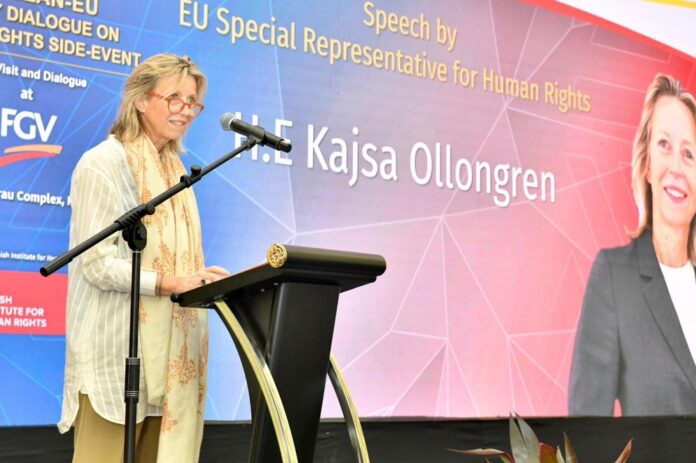KUALA LUMPUR, Oct 20 — The European Union (EU) commended Malaysia’s Asean 2025 chairmanship, describing it as tremendous and impressive, while also expressing hope to strengthen cooperation with the region by enhancing human rights values within future economic and trade agreements.
EU Special Representative for Human Rights Kajsa Ollongren said the EU views Malaysia as a key partner in the region, particularly in advancing policy dialogue on human rights alongside broader cooperation in trade and investment.
“Malaysia has done a tremendous job being the Chair of Asean.
“For the European Union, Malaysia is a very relevant partner not only in foreign trade and investment, but also specifically on human rights related and economical agenda,” she told Bernama in an exclusive interview on the sidelines of her visit here, recently.
The Myanmar conundrum
Ollongren said Malaysia as current Asean Chair has played an important role to support dialogues between regional and international human rights agencies to end humanitarian aggression in Myanmar.
However she noted more need to be done, urging for Asean to press Myanmar’s warring factions to halt violence against civilians.
She reaffirmed EU’s supports for the Asean-led Five-Point Consensus (5PC) aimed at ending violence and restoring stability in the country.
The crisis, which began following the military coup in February 2021, has led to widespread conflict and forced thousands of civilians to flee their homes and seek refuge abroad, including in Malaysia.
As of May 2025, there were 200,260 refugees and asylum-seekers from Myanmar registered in Malaysia.
The affected comprised of Rohingyas, Chins, and other ethnic groups from conflict-affected areas or those fleeing persecution in the country.
Advocating human rights cooperation
Elaborating, Ollongren said the EU is looking forward to work closely with Malaysia and other Asean countries to ensure that human rights principles are embedded in future trade cooperation between both regions.
“I hope that as we move forward with the free trade agreement, we will be able to take human rights concerns on board, with the goal of strengthening its (human rights) role as an integral part of the future agreement currently being negotiated,” she said.
The EU was Malaysia’s fourth-largest trading partner in 2024, while Malaysia was the EU’s 22nd largest trading partner with total trade amounting €46.4 billion (RM229.3 billion).
Regionally, Malaysia was the EU’s third-largest trading partner within the Association of Southeast Asian Nations (Asean).
On Jan 20, 2025, the EU and Malaysia announced the resumption of negotiations for a comprehensive and modern free trade agreement (FTA) with the first round taking place in late June.
The agreement was initially launched in 2010. In 2012 and after seven rounds of negotiations, it was put on hold at Malaysia’s request.
According to the European Commission, in 2023, both parties began a stocktaking exercise to determine their positions regarding a possible resumption of the negotiations.
The EU carried out a joint scoping exercise with Malaysia to determine the scope and the level of ambition of the future trade agreement, which concluded in Dec 2024.
Advancing human rights dialogue
Ollongren was recently on a working visit to Kuala Lumpur to attend the EU-Asean Policy Dialogue on Human Rights, a key platform for discussions on human rights between the two regions in the past decade.
The meeting covers various themes including civil society and political rights, environmental rights, and labour rights, reflecting the current stage of regional development and the evolving human rights landscape in Asean.
Ollongren said she had met and exchanged views with Malaysian Members of Parliament on the UN Convention on Refugees.
“I have discussed the possibility of Malaysia joining the convention to strengthen the relationship with the UNHCR, and Malaysia could also profit from the capacity and the capability of the agency,” she said.
She also held dialogues with Malaysia’s Human Rights Commission (SUHAKAM) and Asean Intergovernmental Commission on Human Rights (AICHR) to continue working together to strengthen human rights protection and civic space within the Asean region. — Bernama


